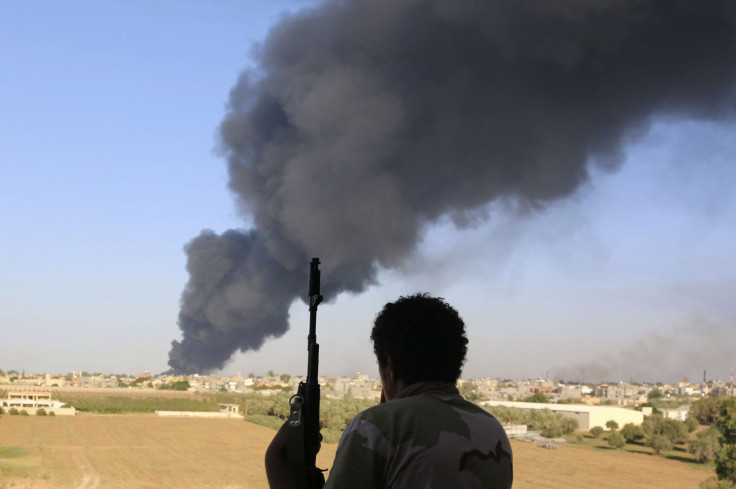Airstrikes In Libya Kill Six, But No One Knows Who Is Responsible

In the middle of the night, residents of Tripoli, Libya, heard the sounds of large blasts. But no one knows who was causing them. A series of airstrikes in the night between Monday and Tuesday killed six people, but no information is available about who is responsible. Several sources reported that positions held by fighters from the city of Misratah were hit with precision weapons, but that could not be confirmed.
For more than a month, Libya has experienced intense clashes between rival militias, the most violent battle taking place at the Tripoli airport. The fighting in Libya began in May when former Libyan Army Gen. Khalifa Hifter and his rebel supporters launched an offensive in the eastern city of Benghazi against government forces. Hifter has said his goal is to rid the country of Islamist fighters and to take over power.
Hifter's offensive only strengthened the infighting between rebel factions that emerged after the 2011 revolution. In July, the United Nations evacuated its staff from Libya, and the Maltese Air Traffic Service, which is responsible for controlling Libya's airspace, announced that it would close for a month.
Hifter claimed responsibility for the airstrikes in Tripoli Monday, but it is unlikely his forces have the skill to conduct the attacks. The Libyan government, as well as the Italian, British, French and American governments -- all involved in the development of Libya post-revolution and whose air forces took part in the 2011 bombing campaign -- denied responsibility.
The U.K., Italy and Turkey are currently helping Libya's military as part of an agreement to train general-purpose forces. The U.S. is also set to begin training the Libyan army, but officials at the State Department have said that no contract has been signed. In a January press release, the U.S. Defense Security Cooperation Agency said it notified Congress of a possible foreign military sale to Libya for the training and equipment, parts and logistical support worth $600 million.
In a statement Monday, Major Gen. Suleiman Obeidi said the Libyan air force did not have the capacity or technology to carry out the airstrikes. According to Marsad Libya, an online platform that monitors the Libyan security sector, one of the weapons dropped in Tripoli was a U.S.-made Mark 83 general purpose bomb. The Libyan air force, or rather its remnants after the 2011 air campaign by a U.S.-led coalition largely destroyed it, does not such weapons, nor the ability to conduct precision strikes, much less at night.
Six people were killed in the airstrikes, according to the Associated Press, but the identities of those killed have not been revelead.
A Libyan source living in Malta who was contacted by IBT said his uncle was killed in the recovery effort following one of the blasst. The man who was killed was identified as Adel Ali Khalifa Abuabdullah. According to a Facebook post, Abuabdullah was killed on August 18 when he heard aircraft had bombed an area in Tripoli. He apparently went to the scene to help recover bodies when an explosion killed him.
An Egyptian official told Reuters that air traffic between the two countries had been interrupted for six hours in the early hours of the morning on Tuesday.
© Copyright IBTimes 2024. All rights reserved.





















